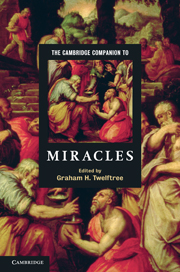16 - Philosophers on miracles
from Part IV - Miracle today
Published online by Cambridge University Press: 28 May 2011
Summary
THREE QUESTIONS
Philosophers have long been interested in miracles, but should they be? In what follows I argue that the question of miracles is philosophically uninteresting, and that recent work by philosophers on miracles often illustrates this. What is more, the central question of whether anyone is in fact justified in believing in miracles is often obfuscated or begged. Of course to say that miracles are largely philosophically uninteresting does not mean that they are uninteresting per se. I conclude with a brief account of the religious significance of alleged miracles.
Aquinas says ‘those things are properly called miracles which are done by divine agency beyond the order commonly observed in nature [praeter ordinem communiter observatum in rebus]’. This is the account or definition of miracles I shall adopt. There are basically three philosophical questions of interest about miracles. The first is whether miracles are possible. The second is whether anyone can ever be justified, epistemologically speaking, in believing that a miracle has occurred. With regard to this question it is important to note that the fact one can imagine conditions in which belief in a miracle would be justified does absolutely nothing to show that anyone has been or now is so justified. The third question is whether anyone is or ever has been so justified. These questions can be answered in short order. The first two questions have sheltered philosophers from dealing with the only philosophically significant question about miracles per se – the third question.
- Type
- Chapter
- Information
- The Cambridge Companion to Miracles , pp. 291 - 308Publisher: Cambridge University PressPrint publication year: 2011
- 3
- Cited by

